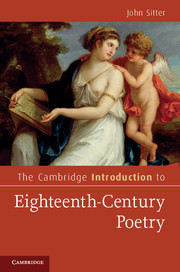Introduction
Published online by Cambridge University Press: 05 June 2012
Summary
Esther Greenwood, the twenty-year-old narrator of Sylvia Plath’s The Bell Jar, was studying literature in the 1950s, but her assumptions remain common in some quarters today:
There were lots of requirements and I didn’t have half of them. One of the requirements was a course in the eighteenth century. I hated the very idea of the eighteenth century, with all those smug men writing tight little couplets and being so dead keen on reason. So I skipped it.
I hope this book will help readers overcome the barriers – ranging from Romantic and Modern myths to inexperience – that often dull our senses to eighteenth-century poetry. Early chapters aim to test and sharpen our hearing as readers; several of the later ones focus on vision. Along the way it should become clearer, to take the young Esther Greenwood’s preconceptions individually, that the period’s poets included many women as well as men, that they were no more smug on average than poets of other eras, that what complacency they harbored was not due to a confidence in reason (which they mostly distrusted), that they wrote blank verse, odes, and various other stanzaic forms as well as rhymed couplets, and that the couplets they did write were not automatically “little,” often aspiring instead, like the late twentieth-century poet A. R. Ammons, toward a versification capable of the “sweet ingestion” of nearly anything, a poetry “multiple and embracing.”
- Type
- Chapter
- Information
- Publisher: Cambridge University PressPrint publication year: 2011



